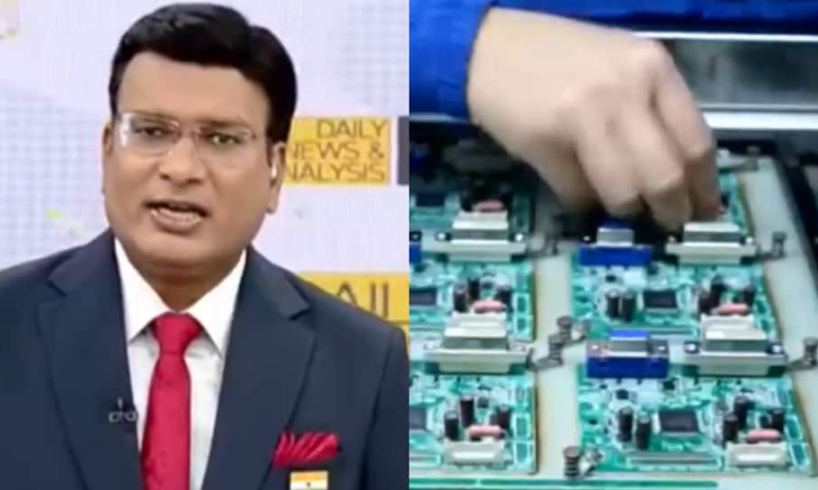
In a significant technological development, India has unveiled its first fully indigenous 32-bit semiconductor processor chip, named Vikram-3201. The chip was introduced on a global platform during ‘Semicon India 2025’ at the Yashobhoomi Convention Centre in Delhi.
This initiative, referred to as “Operation Vikram”, marks India’s serious push toward self-reliance in semiconductor technology. Developed by the Semiconductor Laboratory (SCL) of the Indian Space Research Organisation (ISRO), Vikram-3201 is specifically designed for use in ISRO’s launch vehicles (rockets). The chip is built to endure the extreme conditions of space, capable of operating in temperatures ranging from -55 degrees Celsius to 125 degrees Celsius. In today’s DNA episode, Rahul Sinha, Managing Editor of Zee News, analysed India’s first fully indigenous 32-bit semiconductor processor chip:
Watch DNA Episode Here:
Add Zee News as a Preferred Source
#DNAWithRahulSinha | ‘ट्रंप टैरिफ’ से रण..भारत का ‘ऑपरेशन विक्रम’, हिंदुस्तान की पहली ‘स्वदेशी चिप’ का विश्लेषण
भारत में बनी पहली चिप ‘विक्रम’ लॉन्च, अंतरिक्ष मिशन के लिए इसरो ने बनाया#DNA #India #Chip #Vikram #ChipVikram @RahulSinhaTV pic.twitter.com/BWzYh4LyFP
— Zee News (@ZeeNews) September 2, 2025
A Strategic Step Towards Technological Sovereignty
With this development, India has laid the foundation for what is being seen as a major leap toward technological self-reliance. The Vikram chip is expected to significantly reduce India’s dependency on foreign imports for space-grade chips and lower the overall cost of its space missions. It is being considered a game-changer in India’s ambition to become a global semiconductor hub.
Prime Minister Narendra Modi, who unveiled the chip, likened it to a “digital diamond”, emphasising its strategic and economic importance. This launch is being viewed as a direct response to global technology dominance, particularly from countries that have, at times, restricted tech exports to India.
Not Just a Chip — A Message to the World
The Vikram-3201 chip is more than just a technical achievement — it’s a message to countries that have used technological dominance to exert pressure on India. With this development, India is signaling that it will no longer remain dependent on foreign nations for critical space-grade electronics.
While India’s step into the semiconductor arena may appear small compared to global giants like Taiwan, China, or the US, it is being hailed as a potential milestone in the years to come.
As the world moves towards digitization and automation, chips are becoming central to economic security and strategic independence.
What’s Changing In India?
India’s late entry into the semiconductor race stems from a series of setbacks and policy delays:
– A mysterious fire at the Semiconductor Laboratory in Mohali in 1989 slowed progress.
– In the 1960s, US chipmaker Fairchild showed interest in India but moved to Malaysia due to bureaucratic delays.
– Lack of infrastructure and high manufacturing costs compared to nations like China further hindered growth.
But recent years have shown a shift. The India Semiconductor Mission was launched in 2021, and by 2023, India approved its first semiconductor plant in Sanand, Gujarat. Currently, 10 semiconductor projects are underway across six states: Gujarat, Assam, Uttar Pradesh, Punjab, Odisha, and Andhra Pradesh, with investments exceeding Rs. 1.6 lakh crore.
India also plans to begin commercial chip production later this year, aiming to become one of the top five semiconductor-producing nations by 2032.
A 1 Trillion Dollar Global Market
Globally, the semiconductor market is valued at around 600 billion dollars, projected to grow to 1 trillion dollars by 2030. In India, the semiconductor market was estimated at 45–50 billion dollars in 2024–25 and is expected to double by 2030.
Dominated currently by global giants like TSMC (Taiwan), Samsung (South Korea), Intel, and NVIDIA (USA), the industry is fiercely competitive. But with initiatives like ‘Operation Vikram’, India is positioning itself as a future contender.





